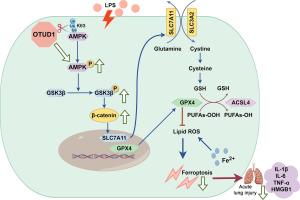OTUD1通过调控AMPK和GSK3β/β-catenin信号通路抑制巨噬细胞铁凋亡,在脓毒症诱导的急性肺损伤中发挥保护作用
IF 4.7
2区 医学
Q2 IMMUNOLOGY
引用次数: 0
摘要
脓毒症是一种危及生命的器官功能障碍,由感染引起的炎症和免疫反应失调引起。其全球发病率和死亡率仍然很高,对公众健康构成严重威胁。急性肺损伤是脓毒症常见的严重并发症。目前对脓毒症引起的急性肺损伤(SI-ALI)的发病机制和有效治疗策略的了解仍然不足。本研究旨在探讨去泛素酶OTUD1在脓毒症诱导的肺损伤中的作用及其机制。通过联合基因敲除技术和铁沉抑制剂构建脓毒症肺损伤小鼠模型,我们系统分析了OTUD1在脓毒症相关肺损伤中的保护作用,并探讨了AMPK和GSK3β/β-catenin信号通路的调控作用。结果表明,OTUD1基因缺失加重了脓毒症小鼠肺组织损伤和炎症反应,同时增加了铁凋亡水平;用铁下垂抑制剂铁抑素-1预处理可显著改善这些效果。进一步的机制研究表明,OTUD1可能通过调节AMPK和GSK3β/β-catenin通路的激活状态来调节肺组织铁下垂水平。具体来说,OTUD1可能会去除AMPK上k63连接的泛素链,改变其蛋白质构象,随后促进AMPK磷酸化,从而调节GSK3β/β-catenin信号级联。综上所述,本研究首次系统阐明了OTUD1在脓毒症肺损伤中的保护作用及其与铁上塌的关系,为脓毒症肺损伤的治疗提供了新的分子靶点和理论基础。本文章由计算机程序翻译,如有差异,请以英文原文为准。

OTUD1 inhibits macrophage ferroptosis via regulation of AMPK and GSK3β/β-catenin signaling pathways exerting protective effects in sepsis-induced acute lung injury
Sepsis is a life-threatening organ dysfunction caused by dysregulated inflammatory and immune responses to infection. Its global incidence and mortality remain high, posing a severe threat to public health. Acute lung injury (ALI) is a common and serious complication of sepsis. Current understanding of the pathogenesis and effective therapeutic strategies for sepsis-induced acute lung injury (SI-ALI) remains insufficient. This study aims to investigate the role and underlying mechanisms of the deubiquitinase OTUD1 in sepsis-induced pulmonary injury. Using a mouse model of sepsis-induced lung injury combined with genetic knockout techniques and ferroptosis inhibitors, we systematically analyzed the protective effects of OTUD1 in sepsis-related lung damage and explored the regulatory roles of AMPK and GSK3β/β-catenin signaling pathways. Results demonstrated that OTUD1 gene deletion exacerbated lung tissue damage and inflammatory responses in septic mice while increasing ferroptosis levels; pretreatment with the ferroptosis inhibitor Ferrostatin-1 significantly ameliorated these effects. Further mechanistic studies revealed that OTUD1 may regulate ferroptosis levels in lung tissue by modulating the activation status of AMPK and GSK3β/β-catenin pathways. Specifically, OTUD1 may remove K63-linked ubiquitin chains from AMPK, altering its protein conformation and subsequently promoting AMPK phosphorylation to regulate the GSK3β/β-catenin signaling cascade. Collectively, this study provides the first systematic elucidation of OTUD1's protective role in sepsis-induced lung injury and its relationship with ferroptosis, offering novel molecular targets and theoretical foundations for the treatment of sepsis-associated pulmonary damage.
求助全文
通过发布文献求助,成功后即可免费获取论文全文。
去求助
来源期刊
CiteScore
8.40
自引率
3.60%
发文量
935
审稿时长
53 days
期刊介绍:
International Immunopharmacology is the primary vehicle for the publication of original research papers pertinent to the overlapping areas of immunology, pharmacology, cytokine biology, immunotherapy, immunopathology and immunotoxicology. Review articles that encompass these subjects are also welcome.
The subject material appropriate for submission includes:
• Clinical studies employing immunotherapy of any type including the use of: bacterial and chemical agents; thymic hormones, interferon, lymphokines, etc., in transplantation and diseases such as cancer, immunodeficiency, chronic infection and allergic, inflammatory or autoimmune disorders.
• Studies on the mechanisms of action of these agents for specific parameters of immune competence as well as the overall clinical state.
• Pre-clinical animal studies and in vitro studies on mechanisms of action with immunopotentiators, immunomodulators, immunoadjuvants and other pharmacological agents active on cells participating in immune or allergic responses.
• Pharmacological compounds, microbial products and toxicological agents that affect the lymphoid system, and their mechanisms of action.
• Agents that activate genes or modify transcription and translation within the immune response.
• Substances activated, generated, or released through immunologic or related pathways that are pharmacologically active.
• Production, function and regulation of cytokines and their receptors.
• Classical pharmacological studies on the effects of chemokines and bioactive factors released during immunological reactions.

 求助内容:
求助内容: 应助结果提醒方式:
应助结果提醒方式:


